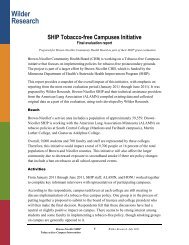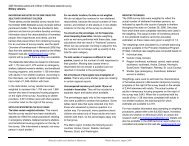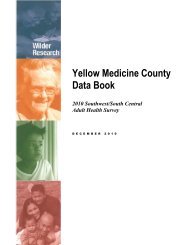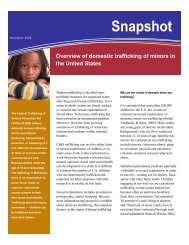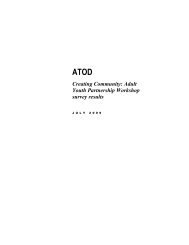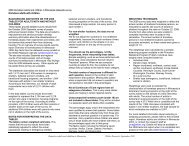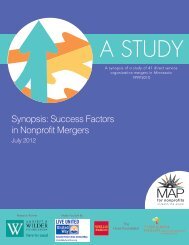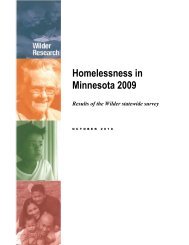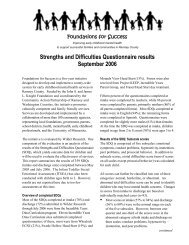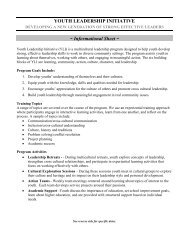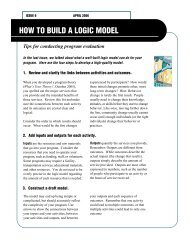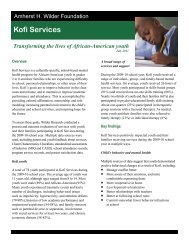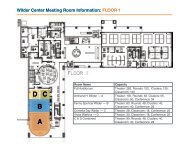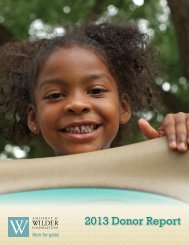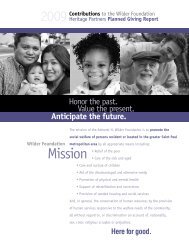2011 Annual Report - Amherst H. Wilder Foundation
2011 Annual Report - Amherst H. Wilder Foundation
2011 Annual Report - Amherst H. Wilder Foundation
You also want an ePaper? Increase the reach of your titles
YUMPU automatically turns print PDFs into web optimized ePapers that Google loves.
<strong>Wilder</strong> Research provides research, evaluation, and consulting services<br />
to improve the lives of vulnerable individuals and families and enrich the<br />
communities in which they live.<br />
In FY <strong>2011</strong>, under the leadership of Executive Director Dr. Paul Mattessich,<br />
<strong>Wilder</strong> Research brought attention to key issues such as health inequities,<br />
lack of access to quality child care among low-income populations, and the<br />
rise in homelessness. Minnesota Compass, a quality-of-life indicators project<br />
led by <strong>Wilder</strong> Research and supported by a collaboration of funders, was<br />
expanded and is quickly becoming recognized as the “go-to” resource for<br />
unbiased facts and information about trends that affect Minnesota’s<br />
quality of life.<br />
Over the course of the year, <strong>Wilder</strong> Research produced 257 reports and<br />
engaged 4,301 individuals in events, trainings, and presentations. <strong>Wilder</strong><br />
Research also worked closely with the <strong>Wilder</strong> <strong>Foundation</strong> to evaluate<br />
<strong>Foundation</strong> programs including Hlub Zoo, Project Kofi, Achievement Plus,<br />
and the Child Development Center.<br />
Hmong Mental Health: <strong>Wilder</strong> Research Proactively Assess and Identifies<br />
Service Gaps<br />
Despite being twice as likely to experience mental health issues, members of the Hmong<br />
community are less likely to use mental health services. A study released last year by <strong>Wilder</strong><br />
Research is increasing awareness of Hmong mental health needs and helping the <strong>Wilder</strong><br />
<strong>Foundation</strong> and others better serve the Hmong community.<br />
The <strong>Wilder</strong> <strong>Foundation</strong> commissioned the report, which was also supported by Ramsey County<br />
Human Services, Children’s Mental Health. The report identified barriers to mental health services,<br />
including providers not recognizing unique symptoms, a shortage of Hmong providers, a lack of<br />
culturally relevant screening and assessment tools, and inadequate reimbursement for such services.<br />
<strong>Report</strong>s of note include:<br />
• A New Age of Immigrants: commissioned by The Minneapolis <strong>Foundation</strong>,<br />
describes characteristics of Minnesota’s immigrant population; economic,<br />
social, and cultural effects of immigrants; and policy considerations.<br />
• Child Care Use in Minnesota: a report of the 2009 statewide household<br />
child care survey, commissioned by the Minnesota Department of Human<br />
Services, paints a detailed picture of child care choice, satisfaction, and<br />
affordability.<br />
• The Unequal Distribution of Health in the Twin Cities: commissioned by<br />
Blue Cross and Blue Shield of Minnesota <strong>Foundation</strong>, reveals disturbing<br />
health inequities by income, race, and neighborhood in the seven-county<br />
Twin Cities region.<br />
• Promise Neighborhood Community Assessment: funded by the U.S.<br />
Department of Education, provides demographic characteristics of residents<br />
and describes needs and assets of the Frogtown and Summit-University<br />
neighborhoods.<br />
• Statewide Health Improvement Program (SHIP): project evaluations and<br />
surveys for SHIP grantees around the state who are working to improve<br />
healthy behaviors.<br />
Many of the recommendations from the study are already incorporated in <strong>Wilder</strong>’s mental health programming, including<br />
the innovative Hlub Zoo school-based mental health program designed for elementary-age Hmong girls and boys. A forum<br />
held last fall for school personnel, health providers, and others who work with the Hmong community increased awareness<br />
of symptoms and culturally focused services. Ramsey County has noted the number of Hmong seeking services has risen<br />
since the study was released.<br />
5



